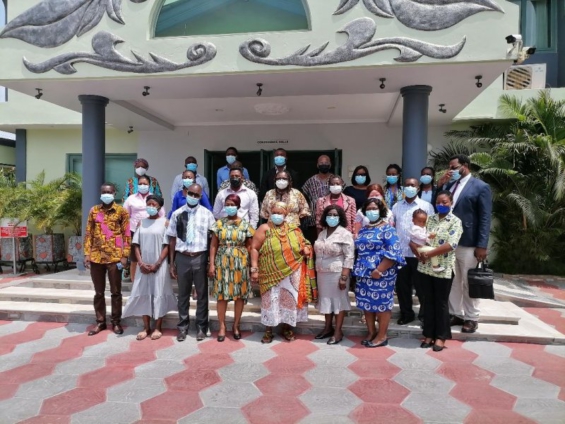
Audio By Carbonatix
Stigma and discrimination related to disabilities and mental health are widespread in the country, lowering the self-esteem of persons with disabilities, a new study has indicated.
The study also revealed that stigma and discrimination being experienced by persons with disabilities and mental health were being perpetuated at home, workplaces, public places, and places of worship.
These lived experiences of stigma are reported to have had profound effects on the self-esteem and confidence of people with disabilities.
Persons with disabilities, who participated in the study, that formed part of the Somubi Dwumadzie project are reported to have indicated that the experience of stigma and discrimination had made them feel unwanted, shy and isolated, and hesitant to attend large gatherings or meetings.
For instance, one of the respondents, Razak Abdul, who spoke at the launching of the Ghana Somubi Dwumadie project in Accra on Thursday, said due to stigma, he had stopped going to the Mosque for almost 10 years now, except on festive occasions.
Sharing his experience on stigma as a visually impaired person, Mr Abdul, who has a degree in Education from the University of Cape Coast, said: “for me, I go to the Mosque only on special occasions. And even with that one, I go with an adult; else I will be treated like a beggar.”
He said previously when he used to go to the mosque for regular prayers, each time his fellow worshippers saw him, they wanted to give him alms, and when he refused it, some would openly remark, “but aren’t you a blind man.”
Mr Abdul is now gainfully employed as a Social worker at the Ayawaso East Municipal Assembly, having been refused employment as a teacher because of his blindness, even though he did his national service as a teacher.
The Somubi Dwumadie, a four-year project funded by the UK Government through the UK Aid, is helping to ensure that the health and well-being of persons with disabilities and mental health conditions were improved.
It is also expected to enable persons with disabilities to be engaged, empowered, and enjoy improved social and economic outcomes and rights.
Therefore, the formative study was undertaken in November 2020 in communities within four regions, namely Upper East, Northern, Western and Greater Accra regions, Mr Joseph Mensah, Civil Society Grants, and Social Movement Technical Adviser of the Somubi Dwumadie Project explained.
He said the study revealed drivers of such stigma and discrimination against persons with disabilities and mental health, including the use of negative language, limited understanding of mental health, religion, culture, and the poor implementation and enforcement of existing laws and policies on disability mental health.
Consequently, the Hope for Future Generations (HFFG) and the PsykForum, two national non-governmental organisations, under a consortium, have been awarded a grant from the Ghana Somubi Dwumadie project to promote mental health and disability inclusion in Ghana.
Mrs Cecilia Senoo, Executive Director of the HFFG, said within the next three years, they would work to ensure that stigma meted to persons with disabilities were addressed and ensure that such persons were empowered to do away with self-stigma and discrimination.
They would also work to ensure that policies put in place in the country well addressed the needs, including the psychological needs of persons with disabilities.
Mrs Senoo said the project would be implemented in 18 districts within the Greater Accra, Central, North East and Savannah regions, ensuring a positive culture of support to allow people with disabilities and mental health conditions to reach their full potential.
It would also increase the use of positive disability and mental health language among community stakeholders and the media and improve the enforcement of Ghana’s Disability and Mental Health policies and laws by duty bearers.
Latest Stories
-
A celebration of homegrown talent: Lagos meets Accra with cross-border fashion pop-up
2 minutes -
Prudential Bank empowers merchant partners with POS training in Accra and Kumasi
13 minutes -
There’s a challenge in our party, and we need a bold leader to win power for us – Bryan Acheampong
15 minutes -
Asantehene is a national asset – Mahama commends Otumfuo’s role in Bawku peace process
38 minutes -
PruRide Accra champions health, youth empowerment and sustainability through cycling
39 minutes -
Ghana set for a dazzling Christmas 2025
43 minutes -
Dr. Bawumia is the overwhelming favourite in NPP primaries with 69.7% lead – new survey
47 minutes -
Jospong Group donates towards Zoomlion Central Mosque completion
57 minutes -
NPP delegates rate Dr. Bawumia as the candidate with the strongest leadership qualities – survey
1 hour -
Nigeria beats Ghana, Liberia and China to win ABF 2025
1 hour -
Rolihlahla Africa Law Journal debuts with five inaugural papers
1 hour -
African Athletics Championships to slated for May 12, 2026 in Accra
1 hour -
GHAFFAP advocates government support to farmers in restoration of degraded forests
1 hour -
A dream deferred: The journey of a loading boy
2 hours -
Clothed in Wisdom: Asantehene’s ‘Akunin Ntoma’ carries a symbolic message at the Presidency
2 hours

